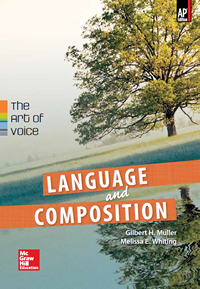
Language and Composition: The Art of Voice (Muller and Whiting)Chapter 5: Education and Society: How, What, and Why Do We Learn?Chapter OverviewAs you read the essays in this chapter, consider the following questions:
In “Learning to Read and Write,” a chapter from his autobiography, Frederick Douglass offers a spirited affirmation of the rights we all should have to pursue an education. For Douglass, who was born into slavery, knowledge began not only with experience but also with the need to articulate that experience through literacy. The ability to read and write should be the possession of all human beings, and Douglass was willing to risk punishment—even death—to gain that ability. Today, all over the globe, as ethnic and political conflicts arise, men and women face the same challenge of expressing themselves. For even with a tool like the Internet, if one does not have the tools to express oneself or if the expression of thought is suppressed, the vehicle for conveying ideas, no matter how powerful, is rendered useless. Perhaps the struggle for an education always involves a certain amount of effort and risk, but the struggle also conveys excitement and the deep, abiding satisfaction that derives from achieving knowledge of oneself and of the world. Time and again in the essays in this chapter, we discover that there is always a price to be paid for acquiring knowledge, developing intellectual skills, and attaining wisdom. However, numerous task forces and national commissions tell us that students today are not willing to pay this price and that, as a consequence, we have become academically mediocre. Is it true that we no longer delight in educating ourselves through reading, as Richard Rodriguez recounts in “The Lonely, Good Company of Books”? Is it true that we take libraries for granted—we expect them to be available but never visit them? A democratic society requires an educated citizenry, people who refuse to commit intellectual suicide or self-neglect. The writers in this chapter, who take many pathways to understanding, remind us that we cannot afford to be passive or compliant when our right to an education is challenged. Today we are in an era of dynamic change in attitudes toward education. Such issues as sex education, multiculturalism, racism, sexism, and immigration suggest the liveliness of the educational debate. Any debate over contemporary education touches on the themes of politics, economics, religion, or the social agenda, forcing us to recognize that configurations of power are at the heart of virtually all educational issues in society today. Without education, many of our ideas and opinions can be stereotyped or prejudiced, bearing no relationship to the truth. It is easy to understand how such views can arise if we are merely passive vessels for others’ uninformed opinions rather than active learners who seek true knowledge. If we judge the tenor of the essayists in this section, we discover that many of them are subversives, waging war against both ignorance and dogma. These writers treat education as the key to upsetting the status quo and effecting change. Operating from diverse backgrounds, they challenge many assumptions about our educational system and invite us to think critically about its purpose. |  |















